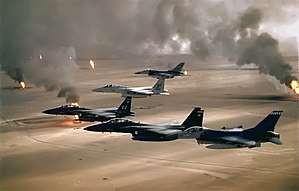United Nations Security Council Resolution 686
United Nations Security Council resolution 686, adopted on 2 March 1991, after reaffirming resolutions 660, 661, 662, 664, 665, 666, 667, 669, 670, 674, 677 and 678 (all 1990), the Council noted the suspension of military activities against Iraq and that all twelve resolutions continue to have full force and effect.
| UN Security Council Resolution 686 | |
|---|---|
 USAF aircraft over burning Kuwaiti oil fields | |
| Date | 2 March 1991 |
| Meeting no. | 2,978 |
| Code | S/RES/686 (Document) |
| Subject | Iraq–Kuwait |
Voting summary |
|
| Result | Adopted |
| Security Council composition | |
Permanent members | |
Non-permanent members | |
The resolution went on to demand that Iraq implement these twelve resolutions, as well as rescind its actions regarding the annexation of Kuwait; accept liability under international law for any loss, damage or injury in Kuwait; release any Kuwaiti or foreign nationals alive or deceased; and return any property seized by Iraq.
Resolution 686 also demanded that Iraq:
- (a) end hostile and provocative actions by its forces against all Member States, including missile attacks;
- (b) arrange for a ceasefire at the earliest possible time by designating military commanders to meet with its foreign counterparts;
- (c) arrange for the release and immediate access to all prisoners of war under the auspices of the International Committee of the Red Cross;
- (d) provide information identifying Iraqi mines, booby traps as well as any chemical and biological weapons in land or water.
The Council also requested international organisations as well as agencies of the United Nations to co-operate with the Government of Kuwait in the reconstruction of their country, deciding that Iraq should inform the Secretary-General and Security Council when it has undertaken actions set out in the current resolution.
Resolution 686 was passed by 11 votes to 1 against (Cuba) with three abstentions from China, India, and Yemen.
Iraq later made concessions on 5 March relating the resolution, including the repeal of Iraqi laws and regulations in Kuwait.[1]
See also
References
- Lauterpacht, Elihu; Greenwood, Christopher J. (2004). International Law Reports, Volume 125. Cambridge University Press. p. 631. ISBN 978-0-521-82989-2.
External links

- Text of the Resolution at undocs.org